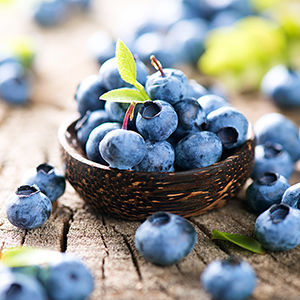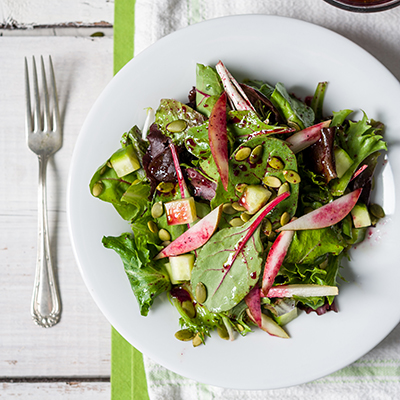- Strawberries
- Cook With Apples
- Grapes
- Grapefruit
- Lemons
- Cabbage
- Asparagus
- All About Bulb Vegetables
- All About Cruciferous Vegetables
- Squash
- All About Root Vegetables
- The Gift of Spice
- Thyme
- Basil
- Raspberries
- All About Tuber Vegetables
- Marjoram / Oregano
- Lemongrass / Citronella
- All Our Fruits, Vegetables and Fresh Herbs
- All About Exotic Fruits
- All About Legumes
- Cooking Pears: Three Inspirational Methods
Blueberries
All About Blueberries

Like its European cousin the bilberry, the blueberry is one of 150 species of whortleberries. Originally from North America, the wild blueberry grows in the woods, in peaty soils and in the mountains. In Quebec, the blueberry is mostly cultivated in Saguenay, where it has become a tourist attraction and an integral part of the region's identity.
Characteristics
There are some thirty species of blueberries. Most blueberry shrubs are small, measuring about 30 centimetres, and generally produce pea-sized berries. Some plants, however, can reach close to two metres in height and produce blueberries as big as marbles.
The sweet flesh of the blueberry is filled with tiny seeds. The skin of the blueberry is covered by a thin, waxy coat called the bloom, which accounts for its matte appearance.

Tips and Advice
- Choose deep-coloured berries that are firm, not shrivelled, and free of mould.
- They can be eaten plain or added to fruit salads, crepes, cereal and pancakes.
- They are often served with fresh cream, fruit juice or alcohol, such as in a smoothie or a cocktail.
- Like all berries, they can be used to make many desserts, jellies, marmalades, pies, pastries, muffins and ice cream. They can be used to make blueberry liqueur and other alcoholic beverages.
- For a quick, light dessert showcasing blueberries, try our Maple Fruit Ramekins or Three-Fruit Mousse.
Expert Tip
The dwarf blueberry is sweeter than the giant blueberry.
Availability
Blueberries are available year-round in Metro supermarkets, but are more plentiful toward the end of the summer during the local harvest.
Nutritional value
The blueberry is a good source of vitamin C, potassium, sodium and fibre. Blueberries are one of the richest plant food sources of antioxidants that fight free radicals and help protect against cancer and heart disease. Polyphenols, the antioxidants in blueberries, also slow the aging process and help prevent urinary tract infections.
Storage
Blueberries are very fragile and should be stored unwashed in the refrigerator, where they will keep for a few days.
If you have more blueberries than you can use, wash and dry them, then freeze. Note that freezing will alter the taste and texture of blueberries, so it’s best to use frozen blueberries primarily for cooking.


















